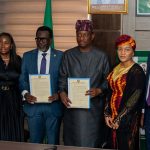Nigeria Successfully Repays First Sovereign Sukuk
…Issues New N300bn Series VII Sukuk
By Patience Ikpeme
The Federal Government of Nigeria has marked a significant achievement by repaying its inaugural Sovereign Sukuk of N100 billion, which was issued in 2017.
This accomplishment fulfills all obligations to investors and reinforces the government’s commitment to transparent and responsible debt management.
The announcement was made during an Investor Meeting hosted by the Debt Management Office (DMO) in Abuja on Monday, to pitch the formal issuance of a new N300 billion Series VII Sukuk to investors.
At the meeting, it was revealed that all investors in the 2017 Sukuk have received full redemption of their investments, having previously been paid their rental returns.
During the issuance event, DMO Director General Ms. Patience Oniha addressed investors, acknowledging recent macroeconomic improvements, including an upgrade of Nigeria’s credit outlook by Fitch Ratings. She noted that these developments indicate progress in both fiscal and monetary management.
“It’s a journey,” Oniha remarked, referring to the path toward sustainable growth. “Development doesn’t happen in one day, but current policies are steering the country in the right direction.”
She attributed part of this progress to recent reforms by the Central Bank of Nigeria, particularly those targeting the foreign exchange market. According to Oniha, the volatility that previously affected the Naira has eased considerably since the fourth quarter of last year, thanks to comprehensive policy interventions.
“There’s more transparency now. FX supply has improved, and the rates have become more stable. Some of the measures were difficult at first, but the benefits are beginning to show,” she stated.
Turning her attention to the oil sector, Oniha expressed optimism that recent presidential initiatives will further enhance revenue from oil and gas, which remain vital components of national income.
Regarding Nigeria’s public debt, she reported that the total debt stock stood at ₦144.67 trillion as of December 2023, nearly evenly split between external and domestic components. Oniha explained that a significant factor in the growth of the debt stock was the depreciation of the Naira, which increased the value of dollar-denominated debts when converted to local currency.
“The external debt has remained around $42.5 billion, only rising slightly after a $2.2 billion Eurobond in December. However, due to the weaker Naira, the debt stock in local terms appears higher,” she noted.
Oniha also pointed out that the inclusion of Ways and Means advances—amounting to N30 trillion—has significantly contributed to the total debt figures. These advances are approved borrowings by the government to cover budgetary shortfalls and are officially included in the debt records.
She reassured investors about the structure and sustainability of Nigeria’s debt, highlighting that the country’s external borrowing comes from a diversified pool, including multilateral institutions like the World Bank and African Development Bank, bilateral partners such as China, India, and Germany, as well as commercial markets like the Eurobond space.
“Over 60 percent of our external debt is from multilaterals and bilaterals, which offer more favourable terms than commercial debt. This diversification reduces our exposure to market shocks and provides stability,” she explained.
On the domestic front, Oniha described the government’s bond market as very active, with a variety of instruments such as Treasury bills, Federal Government Bonds, Savings Bonds, and Sukuk issued regularly.
“There’s something for everyone,” she said. “Whether you are a large institutional investor or a salary earner, there’s an appropriate investment product available. This variety also means the government is not dependent on one single funding source.”
She further noted that domestic debt instruments have long tenures—some spanning up to 30 years—and are a key component of the country’s funding strategy. According to her, over 70 percent of Nigeria’s domestic debt is issued by the federal government.
In assessing the health of Nigeria’s debt profile, Oniha stated that while the debt-to-GDP ratio has crossed 50 percent, it remains within acceptable limits prescribed by international benchmarks, including those of the IMF, World Bank, and ECOWAS.
“Public debt sustainability is not just about the size of the debt,” she said. “It’s about growing revenues and expanding the GDP. As the economy grows and tax revenues increase, our ability to service debt also improves.”
She commended the National Assembly for passing recent tax bills that are expected to enhance revenue collection and reduce pressure on borrowing. These developments, alongside improved oil receipts and foreign exchange reforms, are laying the foundation for more sustainable public finance.
The issuance of the new N300 billion Series VII Sukuk is part of the government’s broader infrastructure financing strategy. Proceeds will be used to fund road projects across the country, continuing the legacy of previous Sukuk issues that have helped transform Nigeria’s transportation network.
The DMO reiterated its commitment to investor engagement and transparency, stating that future Sukuk issuances will adhere to the same principles of Islamic finance that prohibit interest and ensure asset-backed, ethical investing.
In recent years, Sukuk has emerged as a critical funding tool for Nigeria, attracting both domestic and foreign investors while supporting infrastructure development. The DMO’s successful record of timely coupon payments and redemptions has bolstered investor confidence in Nigeria’s debt instruments.
With this latest issuance, Nigeria has deepened its commitment to diversifying funding sources, maintaining debt sustainability, and unlocking infrastructure development for inclusive economic growth.




